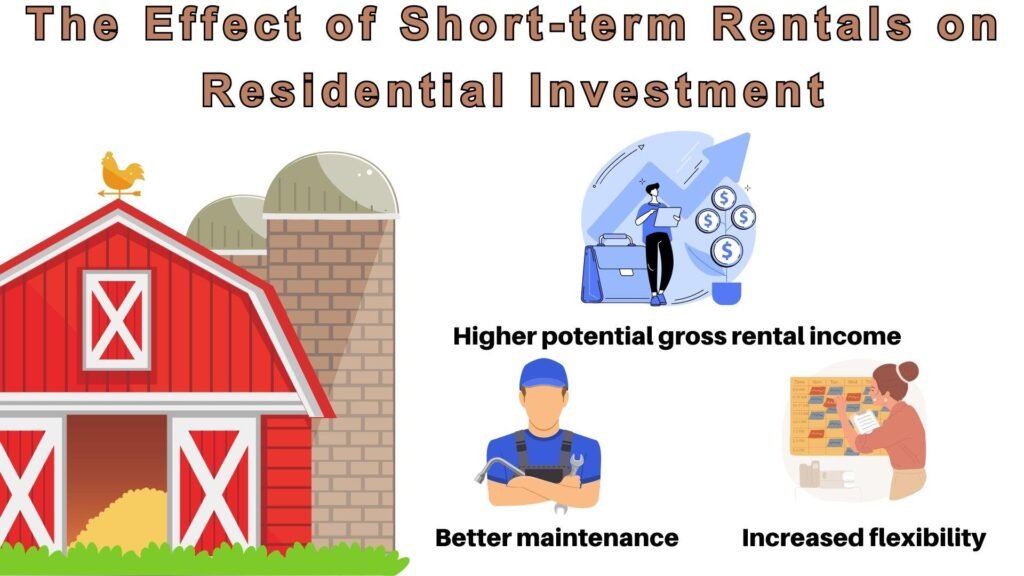Residential real estate investment is a long-term strategy that involves maximizing the potential of your housing properties for the benefit of both you and future generations.
It is one of the most interesting investment options with a very high chance of success, approaching as high as 100 percent. Following the proper protocols ensures a successful investment. This is a part of real estate investment that garners interest from both the young and the old and welcomes new entrants in their hundreds every day.
Although, as recently discovered, this segment of real estate investment is turning a new leaf, as there is a new game in town. The game is Temporary housing.
Temporary housing a.k.a Short-term rental (STR) does not really require you to build a new housing property to participate, as long as you own a house, you are in the game, even if it is the house you live in with your family.
Whenever your House is not in use, you have the option of putting it up for rent, for the short period of time you will not be around.
You can also turn certain parts of your house into a short-term rental unit, which you can list on web-based platforms like Airbnb for short-term rent, even if you are not going anywhere.
Parts of your house like your garage or backyard can be redesigned for short-term residential accommodation. This type of real estate investment is called Accessory Dwelling Units (ADU).
The introduction of Short-Term Rentals (STR) into the real estate industry has been a game-changer. Its effects can be seen in virtually every aspect of the real estate industry, from pricing to regulations.
Its effect hit every player in the real estate industry, users, investors, and even policymakers. Nobody is exempt from feeling the impact of this rapidly growing form of real estate investment.
In this article, we will examine the effects of Short-Term Rentals (STR) and their implications on our traditional real estate patterns, along with their significance for both investors and users. Be sure to pay close attention.
The Effect of Vacation Home Rentals on Long-term Residents

The most notable of all the effects of temporary housing being operated by platforms like Airbnb is the widespread panic over how it is driving the price of residential housing higher and may make housing unaffordable for long-term residents, as landlords are switching from supplying the market for long-term rentals (which serves local resident) to supplying the short-term rental market which serves non-residents.
Truly, affordable housing is a crucial societal value that should never be jeopardized. This fact has driven many policymakers to put strict regulations on the creation and operation of short-term rental properties, in order to curtail its effect on affordable housing.
However, according to research published by Ron Bekkerman, the ability to home-share generally has a positive causal effect on residential real estate investment. The data consists of 2.2 million residential permits and over 550 thousand Airbnb listings from 20 cities, covering a period of 12 years.
The research also shows that STR regulations had a stronger impact on permits for new constructions and structural additions as compared to other types of permits.
Growth in Demand for Temporary Housing
Despite the policies and regulations being enacted on the creation and operation of short-term rentals, the growth of this part of the real estate market has remained strong.
The continued growth of the short-term rental market is not a fluke. It is owing to the fact that short-term rental is not just another idea, it is a big solution to a huge problem that has plagued the real estate industry for a very long time. The need to feel at home even when not at home.
This need is the main factor that contributed to the creation of hotels and motels. But the existence of these inventions did not seem to totally solve the problem.
Short-term rental provides travelers with an alternative option to what hotels and motels offer. The option of experiencing the natural atmosphere of wherever you find yourself, rather than being cooped in a space, isolated from the residential environment.
Whether going for a vacation or a business trip, many travelers are opting for short-term rental homes. Because it presents them with more convenience. Most importantly, short-term rental homes are generally more affordable than hotels.
The metrics published in techvestor data prove beyond a reasonable doubt that the short-term rental market is experiencing rapid growth and is unlikely to slow down any time soon.
As reported by Techvestor;
- Bookings are ticking up: The number of travelers opting for shared-home over hotels is increasing every day.
- Market share is growing: The short-term rental faction is carving a big part of the real estate investment cake.
- Demand is outpacing supply: We now have more people looking for STR than are units readily available.
- Nightly rates are increasing: Owing to the fact above, the economic scale is tilting toward the benefit of landlords.
- Rural, domestic destinations are winning: Users seem to prefer units located in rural and domestic areas to ones in highbrow parts of the city.
This data vividly points toward the fact that investing in beach house rentals, game room rentals, vacation home rentals, and other forms of short-term rental properties is likely to be very profitable.
The Need to Prioritize Housing for Residents Without Jeopardizing Economic Growth
This section of the article addresses policymakers and government officials who, in their efforts to control the rising residential real estate prices due to the emergence of short-term rentals, have implemented policies that inadvertently hinder economic growth.
The emergence of short-term rental presents the world with a whole lot of benefits. Benefits that are both important for economic growth and community development.
Benefits such as,
- Tax Revenue: It’s evident that the growing interest in short-term rental investments will significantly boost the government’s tax revenue. This section of the industry is not just for the 1 percent, it is also affordable for the middle class. Therefore more entrants equals more tax revenue for the government.
- Quality and Quantity of Housing Stock: Short-term rental is very competitive in terms of user experience. Investors are always striving to outdo one another at aesthetics in order to attract more people to their units, and this in effect adds to the quality and quantity of existing housing stock.
In order not to hinder the mentioned benefits, government officials and policymakers need to find better ways (as enumerated by Granicus), to prioritize long-term residential and curtail housing loss to STR activities, without jeopardizing the benefits of short-term rental residential investments.
Final Thoughts
Balancing the economic benefits of short-term rentals with the housing needs of long-term residents is crucial. Policymakers, investors, and communities must collaborate to foster sustainable housing strategies for harmonious coexistence, ensuring thriving neighborhoods in the face of evolving rental trends.
